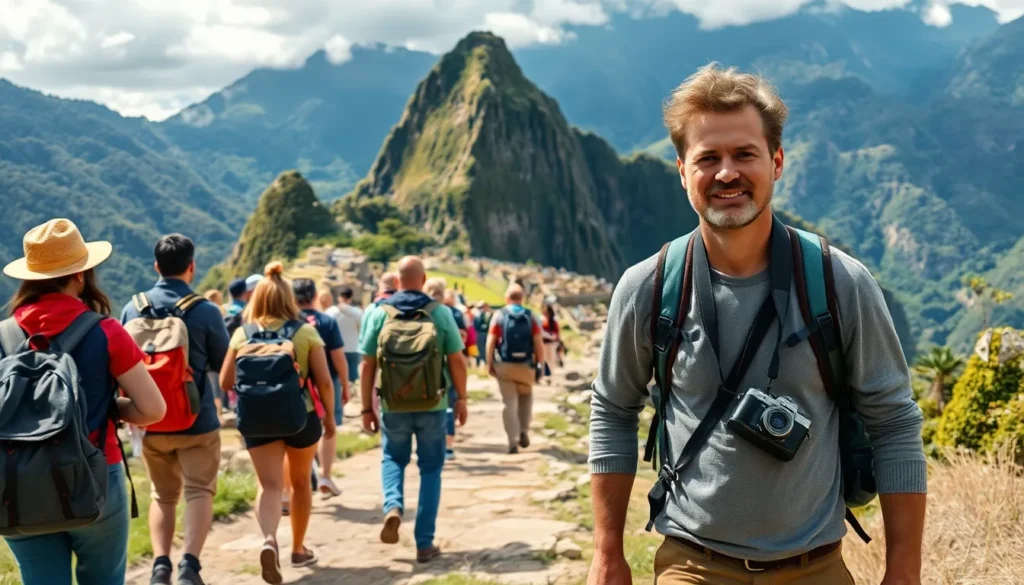Traveling on a budget doesn’t mean sacrificing adventure or experiences. With the right tips and tricks, anyone can explore new destinations without breaking the bank. From finding affordable accommodations to scoring cheap flights, budget travel opens up a world of possibilities for wanderers of all kinds.
In today’s fast-paced world, the desire to travel is stronger than ever. However, many people feel constrained by finances. Fortunately, smart planning and a few savvy strategies can make travel accessible for everyone. Embracing budget travel allows individuals to immerse themselves in different cultures while enjoying the thrill of discovery.
Table of Contents
ToggleOverview of Budget Travel Tips
Budget travel emphasizes exploring and experiencing new destinations while managing expenses. Key strategies streamline planning and maximize enjoyment without financial burden.
Researching Destinations
- Identify affordable locations: Consider lesser-known cities or regions that offer low-cost accommodations and attractions.
- Examine seasonal trends: Travel during off-peak seasons for better rates and fewer crowds.
Finding Flights
- Utilize flight comparison tools: Websites like Skyscanner or Google Flights help find the best deals on airfare.
- Be flexible with travel dates: Adjusting departure or return dates can lead to significant savings.
Accommodations
- Opt for hostels or budget hotels: Affordable lodging options provide value without sacrificing comfort.
- Explore vacation rentals: Platforms like Airbnb offer varied options, often at lower prices than traditional hotels.
Transportation
- Use public transport: Buses and trains typically cost less than taxis or rideshares, providing an authentic travel experience.
- Rent bicycles: Many cities offer bike rentals, promoting an eco-friendly and economical way to explore.
Dining
- Seek local eateries: Dining at food markets or local restaurants costs less than tourist-heavy establishments.
- Embrace picnic options: Shopping at local markets for fresh produce allows for budget-friendly meals outdoors.
Activities
- Prioritize free attractions: Parks, museums on free admission days, and local festivals provide enriching experiences at no cost.
- Leverage travel discount cards: Many cities offer passes, providing discounted entry to multiple attractions.
By implementing these tips, travelers can fully immerse themselves in new cultures while maintaining financial stability. Strategic planning fosters the possibility of frequent travel adventures at a fraction of the cost.
Planning Your Trip

Planning a trip effectively lays the foundation for a successful budget travel experience. Several factors contribute to creating a memorable journey while keeping costs in check.
Setting a Budget
Setting a budget involves determining total travel expenses, including transportation, accommodation, meals, and activities. She should:
- Identify Costs: Estimate the costs associated with travel, accommodation, food, and entertainment.
- Allocate Funds: Divide total funds across categories to avoid overspending in one area.
- Track Expenses: Use budgeting apps or spreadsheets to monitor expenses throughout the trip.
- Adjust Plans: If spending exceeds the budget, evaluate and modify plans accordingly to stay on track.
Choosing Your Destination
Choosing a destination plays a significant role in budget travel. He or she must consider:
- Affordable Locations: Research destinations known for lower costs, such as Eastern Europe or Southeast Asia.
- Seasonal Factors: Assess peak and off-peak seasons to find cheaper travel options and better deals.
- Local Currency: Understand the exchange rates and how they affect overall costs, prioritizing destinations with favorable currency values.
- Cultural Opportunities: Seek locations rich in culture and free attractions to maximize experiences while minimizing spending.
By establishing a solid budget and selecting the right destination, he or she can embark on fulfilling adventures without overwhelming financial strain.
Transportation on a Budget
Travelers can minimize transportation costs by exploring affordable flight options and utilizing inexpensive local transportation methods.
Affordable Flight Options
Budget airlines significantly reduce travel costs. They often provide competitive fares, especially for short-haul flights. Advance booking enhances opportunities for discounted rates. Travelers can save by flying during off-peak seasons or on weekdays when demand is lower. Utilizing flight comparison websites helps identify the best deals available across various carriers. Signing up for newsletters from airlines and travel sites keeps travelers informed about flash sales and exclusive promotions. Using points or miles from loyalty programs offers another avenue for securing low-cost flights.
Inexpensive Local Transportation
Public transport systems typically offer low-cost options for navigating cities. Buses and trains are often more economical than taxis or rideshare services. Many cities provide transport passes that allow unlimited travel for a set duration, delivering added savings. Renting bicycles encourages exploration while promoting fitness. Walking tours provide a free way to connect with local culture. In some destinations, car-sharing services present affordable alternatives to traditional car rentals. Always checking for discounts on tourist transport cards increases savings, allowing travelers to maximize funds for experiences.
Accommodation Choices
Affordable accommodations play a crucial role in budget travel. Various options can help travelers save money while enjoying comfortable stays.
Budget-Friendly Hotels and Hostels
Selecting budget-friendly hotels and hostels enables travelers to minimize accommodation expenses.
- Hostels: They offer shared dormitories and private rooms for lower rates. Amenities may include communal kitchens and social lounges, helping reduce food costs while providing opportunities to meet other travelers.
- Economy Hotels: Chains often provide basic accommodations at competitive prices. Many budget hotels include free breakfast and Wi-Fi, which adds value to the stay.
- Boutique Hostels: Unique hostel options often blend style and affordability. They may offer themed decor and local experiences at budget prices, attracting adventurous travelers.
- Booking Platforms: Websites like Hostelworld or Booking.com feature filters for price and amenities, assisting travelers in finding suitable options easily.
Utilizing Alternative Lodging
Exploring alternative lodging options broadens choices while decreasing costs.
- Vacation Rentals: Platforms like Airbnb or Vrbo provide entire homes or private rooms, often at rates comparable to hotels. These options offer kitchens for cooking, leading to further savings.
- Couchsurfing: This platform connects travelers with hosts willing to provide free lodging. It fosters cultural exchange and may enhance travel experiences by allowing direct engagement with locals.
- Camping: Camping presents an adventurous alternative, with many national parks offering affordable sites. This option immerses travelers in nature while minimizing accommodation expenses.
- House Sitting: This arrangement allows travelers to stay in a home for free while caring for pets or managing the property. It combines cost savings with the experience of living like a local.
Saving on Food and Dining
Travelers can significantly cut expenses on food and dining by utilizing smart eating strategies. Following some key practices can lead to delicious meals without breaking the bank.
Eating Like a Local
Eating at local eateries offers genuine culinary experiences that are often more affordable than tourist-oriented restaurants. Locals frequently provide insight into the best places to eat, including food stalls and markets known for fresh ingredients. Street food is a cost-effective option, offering tasty dishes for a fraction of the price, typically ranging from $1 to $5 per meal, depending on the destination.
Dining during off-peak hours or lunch specials often yields lower prices, allowing travelers to enjoy the same quality of food for less. Adopting cultural dining customs, such as sharing meals, enhances the experience and reduces costs.
Cooking Your Own Meals
Cooking meals can provide substantial savings during travel. Many hostels and vacation rentals offer kitchens, allowing travelers to prepare food rather than dine out for every meal. Buying groceries from local markets also proves to be economical, with costs typically running 30% to 50% less than eating at restaurants.
Simple meals like pasta, salads, and stir-fries require minimal ingredients and preparation time. Additionally, travelers can try local ingredients to create unique dishes, adding to their cultural experience. Sharing cooking responsibilities with fellow travelers can further enhance this experience, making cooking both a social and budget-friendly alternative.
Activities and Sightseeing on a Budget
Travelers can enjoy diverse experiences without overspending by focusing on free and low-cost attractions. Exploring local culture and nature offers enriching opportunities while keeping expenses minimal.
Free and Low-Cost Attractions
Travelers can take advantage of numerous free and low-cost attractions in various destinations. Examples include:
- Parks and Gardens: Many cities feature public parks or botanical gardens, providing beautiful spaces for relaxation and exploration.
- Museums: Some museums offer free admission on specific days or discounted rates for students, seniors, or residents.
- Walking Tours: Self-guided or community-led walking tours offer insights into local history and culture at no cost.
- Local Festivals and Events: Participating in festivals, parades, or cultural events often costs nothing and enhances understanding of local traditions.
Utilizing guides or apps that list free attractions can uncover hidden gems, allowing travelers to explore without financial burden.
Discounts and Passes
Discounts and passes significantly reduce costs for attractions and activities. Travelers can explore several options:
- City Passes: Purchasing city passes often provides access to multiple attractions at a reduced rate, making it more economical to visit popular sites.
- Attraction Cards: Specific attraction cards offer discounts for multiple entrances, such as theme parks or museums, providing considerable savings.
- Membership Discounts: Many organizations provide membership rates for repeat visitors, which can lead to significant savings on future visits.
- Online Discount Sites: Websites often list deals or promotional offers for various activities and attractions, allowing travelers to plan economically.
By leveraging these discounts and passes, travelers maximize their sightseeing opportunities while maintaining a strict budget.
Budget travel opens doors to incredible experiences without breaking the bank. By embracing smart strategies like flexible travel dates and affordable accommodations, anyone can explore new cultures and destinations.
Prioritizing local dining options and free attractions further enhances the travel experience while keeping expenses low. With careful planning and a willingness to adapt, travelers can enjoy rich adventures that don’t compromise their financial stability.
Ultimately, budget travel is about making the most of every opportunity, ensuring that unforgettable memories are within reach for everyone.









